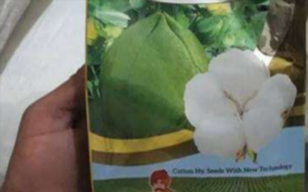Seeds industry demands action; Centre says the onus is on States
The illegal cultivation of herbicide tolerant (HT) Bt cotton has seen a huge jump this year, with seed manufacturers claiming that the sale of illegal seed packets has more than doubled from 30 lakh last year to 75 lakh this year. Industry lobbies have written to the Agriculture Ministry, demanding that action be taken to stop such sales and punish offenders, noting that cultivation of the genetically modified cotton variant has serious environmental and economic consequences.
However, a senior official at the Ministry said it was up to the State governments to enforce the policy. This comes even as activists from the Shetkari Sangathan have stepped up the reach of their civil disobedience movement to demand the legalisation of HTBt cotton by encouraging farmers to plant the seeds in violation of government regulations.
Additional layer
Bt cotton is the only transgenic crop that has been approved by the Centre for commercial cultivation in India. It has been genetically modified to produce an insecticide to combat the cotton bollworm, a common pest. The HTBt cotton variant adds another layer of modification, making the plant resistant to the herbicide glyphosate, but has not been approved by regulators. Fears include glyphosate having a carcinogenic effect, as well as the unchecked spread of herbicide resistance to nearby plants through pollination, creating a variety of superweeds.
“This year there is a big increase in such illegal cultivation especially in Maharashtra from 30 lakh packets last year to about 75 lakh packets this year,” said a letter from Federation of Seed Industry of India executive director Shivendra Bajaj to Agriculture Secretary Sanjay Agarwal earlier this week. “To make matters worse, the illegal seeds are sold using the brand name of prominent companies … Farmers are at risk with such illegal cotton seed sale as there is no accountability of the quality of seed, it pollutes the environment, the industry is losing legitimate seed sale and the government also loses revenue in terms of tax collection,” he added, noting that HTBt seeds are often produced in Gujarat and then moved to Maharashtra.
“It will not only decimate small cotton seed companies but also threatens the entire legal cotton seed market in India,” National Seed Association of India president Prabhakar Rao said on Friday. “Regulators are only limiting their checking to licensed dealers and seed companies while this illegal activity of HT seed sales is carried mostly by unorganised and fly by night operators. Focus must be shifted to catching them and taking exemplary and strong punitive action,” he added.
Deputy Seeds Commissioner Dilip Srivastava admitted that such complaints had become widespread. “You are correct that this has become a major issue. The Centre has made the policy to ban this variant. But it is the State governments that must take action. We are issuing advisories from time to time,” he told The Hindu.
Another senior official said that following Central advisories to all cotton growing States, Maharashtra, Gujarat and Telangana have seized HTBt stock and taken punitive action against the culprits. States have also been asked to regulate the sale of glyphosate.
Labour shortage
However, Shetkari Sanghatana president Anil Ghanwat says that his organisation has no intention of stopping the civil disobedience movement until the crop is legalised, although a few farmers have been arrested and charged under legal provisions attracting a five-year jail term and a penalty of ₹1 lakh.
“There is a shortage of the labour needed to do at least two rounds of weeding for Bt cotton. With HTBt, we can simply do one round of glyphosate spraying with no need for weeding. It saves ₹7,000 to ₹8,000 per acre for farmers,” he explained. “Farmers have seen the benefits last year, so even more are planting it this year. Scientists are also in favour of this crop, and even WHO has said it does not cause cancer. But the government is withholding approval because it is giving into fearmongering,” he added.
In fact, the farmers activist group has also been encouraging farmers to plant genetically modified brinjal and soya bean seeds, which have also not been approved for cultivation.
Source: Read Full Article

